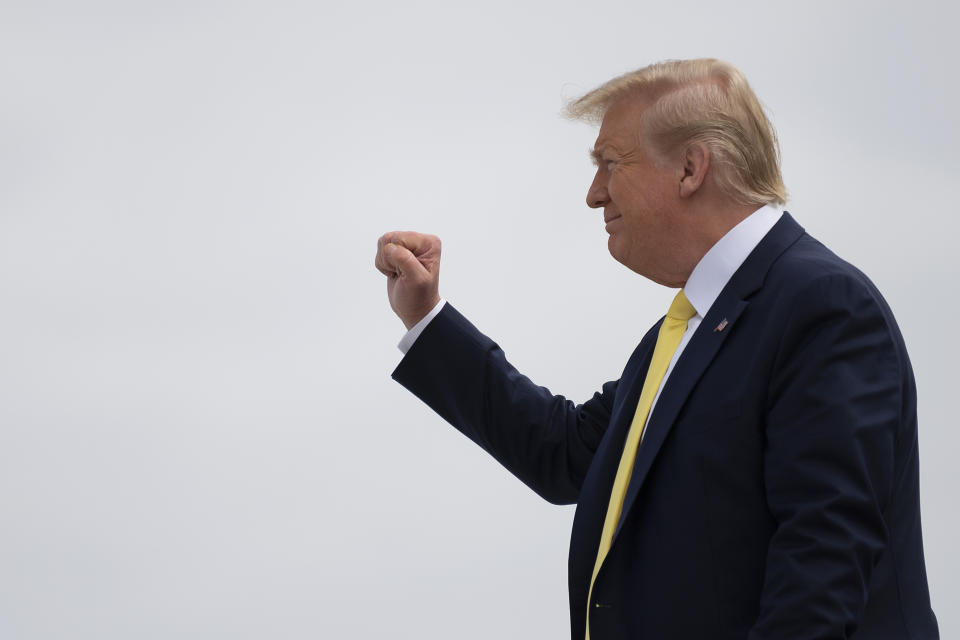Coronavirus response: Washington debates ‘a big coronavirus stimulus’
Amid falling stock and oil prices, Washington is debating a range of ideas this week to try stabilize the U.S. economy during the coronavirus outbreak. This comes in addition to the $8.3 billion spending package that President Donald Trump signed on Friday and the Federal Reserve’s surprise move to cut interest rates by 50 basis points last week.
The Trump administration is reportedly looking at a temporary expansion of paid sick leave and help for companies that are facing disruption. “We would prefer a targeted approach, a rather micro approach, if you understand,” White House National Economic Council Director Larry Kudlow said last Friday.
The White House, which has yet to formally announce its plans, is reportedly meeting later on Monday to consider options.

The Democrats, led by Speaker Nancy Pelosi and Senate Democratic Leader Chuck Schumer, have said they could be on board with an idea like the expansion of paid sick leave but are less receptive toward direct assistance to companies. “[W]e are demanding that the administration prioritize the health and safety of American workers and their families over corporate interests,” they wrote in a joint statement.
And there is a debate among the D.C. economist class about how much Washington can even help at this moment.
"One place where we know for sure we need to react and react strongly and that's the public health mission," Doug Holtz-Eakin, president of the American Action Forum, said on Yahoo Finance’s “YFi PM” Monday. Holtz-Eakin said a fiscal response is trickier. "We have to go for targeted places like cruise ships, airlines, tourism, the conference industry with different tools and the White House is looking at support for those industries."
‘The bigger impact would be psychological’
Greg Valliere, chief U.S. policy strategist at AGF Investments and a close observer of financial issues in Washington D.C., was skeptical of how much of a difference targeted fiscal stimulus would make in the GDP, “but the bigger impact would be psychological,” he wrote. ”Washington has to show that it’s doing something.”
A leading voice in recent days in favor of “a big coronavirus stimulus” has been Jason Furman, who was chairman of the White House Council of Economic Advisers during the Obama administration. He advocates the aggressive idea of a direct payment of $1,000 to every U.S. citizen or taxpaying U.S. resident. “The likelihood that history judges the economic response to coronavirus as too little and too late is much higher than the converse,” he wrote on Friday.

Holtz-Eakin is skeptical of such big measures. “The sort of generic ‘let’s get people to spend money’” approach is not going to help the industries that are hurting, he says. The big question is: “Do you need to do shock and awe because money is cheap and let's spend a lot, or not do that because it's not aimed at the right problem,” he said.
Another voice in favor of bigger action comes from the left-leaning Center for American Progress. Economists Andres Vinelli, Christian E. Weller, and Divya Vijay wrote to recommend “that Congress and the Trump administration engage in fiscal stimulus” in a range of areas, adding “now is precisely the time for deficit spending.”
The chances of action in a dysfunctional Washington
Trump, for his part, has been inclined towards a smaller response even as market losses pile up. On Saturday, he said he was “not concerned at all” as the virus got closer and closer to the White House and then on Monday, he compared it with the “common Flu.”
So last year 37,000 Americans died from the common Flu. It averages between 27,000 and 70,000 per year. Nothing is shut down, life & the economy go on. At this moment there are 546 confirmed cases of CoronaVirus, with 22 deaths. Think about that!
— Donald J. Trump (@realDonaldTrump) March 9, 2020
It remains to be seen whether the White House will try to take executive action on its own or any measure that requires further cooperation with Congress.
Members of Congress — minus a senator and congressman who may have been exposed to the virus — are returning to Washington as some question whether Pelosi will make changes to the House schedule to protect lawmakers.
As Holtz-Eakin noted about the primacy of addressing the public health response first, “if you don't take care of the first one, the shock and awe is not going to help.”
Ben Werschkul is a producer for Yahoo Finance in Washington, DC.
Read more:
Coronavirus response: Breaking down the $8.3 billion emergency spending bill Trump signed
Coronavirus outbreak could easily tip US into a recession: Goldman Sachs
Fed cuts rates by 50 basis points amid coronavirus concerns
Read the latest financial and business news from Yahoo Finance
Follow Yahoo Finance on Twitter, Facebook, Instagram, Flipboard, LinkedIn, YouTube, and reddit.


